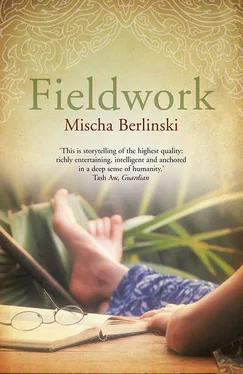Sometimes Laura thought about Bantang. It would be, she imagined, a grand white city, with gold trim, and crisp triangular flags flapping in the mountain breezes along the outer ramparts, against a sky whose blueness made her eyes ache; and after the monotonous foods of the caravan, she dreamed also of the delicious foods she would try when invited, as she surely would be, to the governor's palace. There, seated on a silk
*I was able to read these lovely letters thanks to the kindness of the children of Sarah Howard, Laura's sister, of Topeka, Kansas.
cushion, she would explain her mission to the governor (Dr. Chester gallantly translating) and sip the delicately spiced mutton soup, dip a piece of barley bread in the sauce of the boiled pheasant, and with a very straight proud back recount to the wide-eyed foreigners the very many wonders of life in Oklahoma and the glories of the God who inspired their travels.
The caravan had traveled on foot for almost two months, and it had been five months since the party had made their departure from America, when Dr. Chester announced to the traveling missionaries that, God willing, they would arrive that day at Bantang. They arrived in Bantang that night, God having been willing, and were warmly welcomed by the other permanent missionaries at the station, the MacLyons of Nebraska, who would both be dead of typhoid within a year.
The Walkers had been in Bantang for almost a week when Raymond asked Laura if she was happy there. This was one of the things she liked about Raymond: so many men didn't even know to ask such simple, sensitive questions. She wanted to tell Raymond about the overwhelming strangeness of the place, and about how the size of the mountains scared her and made her feel small and worried for their baby. She didn't complain about Bantang, although it had been something of a disappointment: nowhere near as big and glamorous as Tulsa even, this place was like the Indian country, with its dun-colored clay houses and narrow alleyways in which could be found the occasional corpse of a dog, a cat, or even a donkey. One thought consoled Laura: the women around here were unlikely, she reckoned, to catch Raymond's eye, as their faces were smeared black with honey and dirt, as was the Tibetan custom, and their hair reeked with the smell of rancid butter. She didn't tell Raymond any of these things, reserving her complaints for her sister. She only told Raymond that usually when she prayed at night, she felt a calm come over her and she knew that Jesus was listening to her; but here she had been praying harder the last week than she had ever prayed before, and the sweet sensation hadn't come. This sweet sensation was Christianity to Laura. It was, she thought, the sweetness of being loved. She adored the sweet sensation, and the notion that there were those in the world who did not know that sweetness kept her awake at night, as if she heard the cries of motherless children. This was why when Raymond had proposed a mission to China, she had accepted. Raymond assured her that the sweetness would return, and he was right.
The Walkers had been in Bantang a little over three months when Laura gave birth to Thomas Walker. She had been secretly afraid that the place where he was born would influence the appearance of her child, and that he would be small, with an Asiatic aspect; but he was of a normal size, and pink. Dr. Chester, an amateur phrenologist, studied the boy's skull and said that he would be intelligent and of a passionate nature, a brave servant of Christ. To celebrate the birth, the missionaries of Bantang made strawberry ice cream with ice brought down from the mountains.
Every family tells stories of origins and beginnings, and the story that the Walkers tell of themselves begins here, with the long voyage to the Orient, the caravan ride from Kunming, and the Mission Station at Bantang. Although the great flood of 1934 wiped out the written record of family history, the decisive psychological break had been made already, the day the Maiden of the East pulled leisurely out of the harbor into the Pacific and set sail in the direction of the evening sun.
If the folks in Tulsa really didn't know why Raymond Walker was heading off to China to save souls, it was because they weren't listening, for if there was one thing Raymond Walker liked to do, it was witness the Gospel. You couldn't stop the man. For the rest of his life, he told anyone who wanted to listen, and plenty who didn't, the story of how he got right with God. He told the story in sermons, in speeches, and in friendly informal discourses, which he delivered in stone churches, wooden chapels, and on the slopes of tall mountains, where with his own hands he had cleared an open field of rocks so the people could come and listen. Raymond felt that if all the moments of his life were to be listed in order of importance, that moment in France when he cleared his books with God would stand undisputed at the head.
This was the story that he told.
In the war, a moment had come when he had been in a trench and left for dead: his unit had retreated, and when he awoke, he was alone with glistening, gray corpses on either side of him. It was a clear, cold night lit by a harvest moon, and Raymond lost all hope of living. Even his fear retreated under the certainty of death. And then the miracle happened, and what else could it be called but a miracle? He heard the angels singing. They sang to him a cappella , welcoming him to Heaven, the most pure and lovely sound he had ever heard. They were singing a hymn that he knew from childhood, a tender hymn that he had heard on his mother's lips and many times had sung himself. The angels were singing in four-part harmony. The deep, throaty bass angels sang like the Negro choir he had heard in Tulsa one time, the fundament, the support, the rainbow and reliable anchor that is the promise of God; the tenor angels, hovering above the basses, augmenting, enriching, offering an open hand if only one will accept it; the altos, lovely, incandescent, and maternal; and above all the soprano angels, whose voices were as pure and piercing as morning light. They sang:
There were ninety-and-nine that safely lay
In the Shelter of the fold.
But one was out on the hills far away,
Far off from the gates of gold.
Away on the mountains wild and bare,
Away from the tender Shepherd's care,
Away from the tender Shepherd's care.
Raymond thought he was being welcomed to Heaven. The angels sang to him for hours as he lay immobile in a bloody trench, his limp hand lying in the remains of another man's gut, and when he woke up sometime later, very much alive, he could not deny that he had heard the angels singing and he understood the meaning of their song.
No, if the folks in Tulsa found Raymond's motivations for becoming a missionary mysterious, it certainly wasn't for lack of effort on his part to explain things: when Raymond tried to explain to his father that he was a changed man, his father asked if he wanted to get himself involved in real estate, because he knew a man in Oklahoma City who was looking for a junior partner; and when Raymond talked about things with his mother, she gave him a strange pained look. It was a frustrating time. The only one who had really listened was the pretty nurse with the round cheeks at the VA hospital where Raymond went twice weekly to treat his injured shoulder, and the two of them sat talking for hours in the hospital's rose garden. When he had told her about the angels, her eyes had grown misty, and Laura had smiled and said, "That must have been lovely. I wish I had heard the angels." Lovely —that was just the word Raymond had been looking for. He said, "It was. It was lovely." Then they got to talking more, and Raymond told her what he hadn't told anybody else: that he had been turning things over in his head, slowly thinking it through, and the only explanation he could come up with for everything he'd seen was that the world was in the midst of the Final Battle. The end was coming, just like in prophecy, and it wouldn't be long now before God judged each and every man. He admitted that the spectacle of the nations turning upon each other in this awful combat had shaken him to his core: the combatants were men who had been given the gift of the Gospel and then squandered it. He had gone back and read Daniel and Revelation, and things were just so clear to him, what was coming, the terrible Day when every man would be judged fairly. He hadn't been living right, he confessed to Laura. He hadn't been living right at all, he said, and by the things he had seen, the giant explosions, he knew that the world could end. It was a distinct possibility. And Laura said that when you saw a cyclone coming, you closed the blinds, put the family in the root cellar, and warned the neighbors.
Читать дальше












